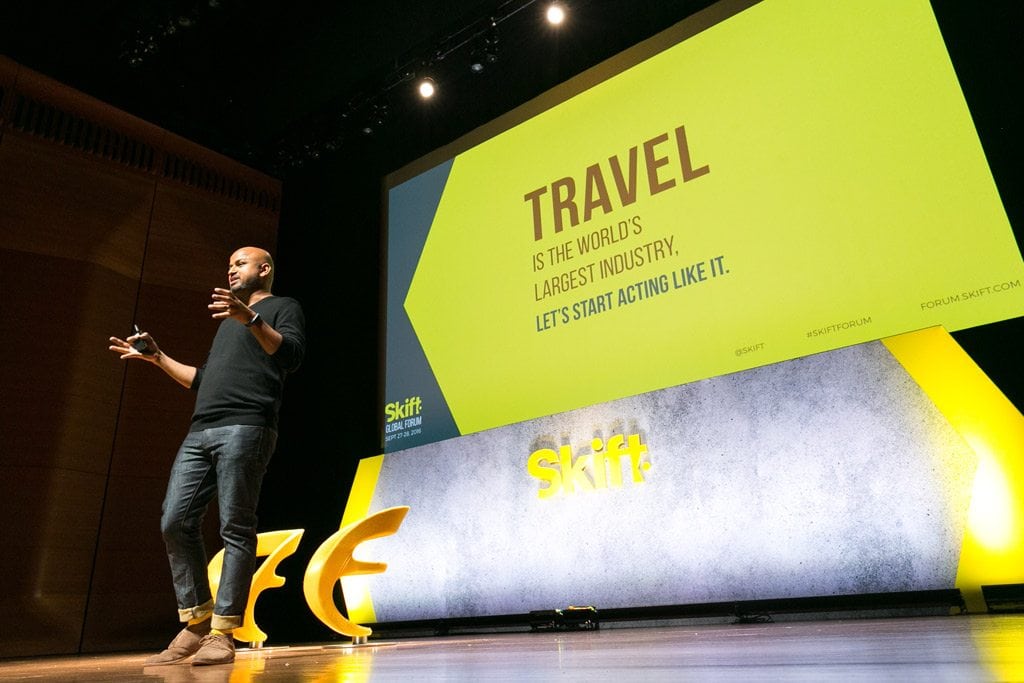Skift Take
Never accused of holding back on what we think, what we have learned and unlearned. My lessons from six years of Skift and eight years exploring the travel industry.
I started exploring the travel industry in the fall of 2010, when I first began thinking about doing a consumer travel startup, after I had sold my first company and left earlier that summer on a two-year travel sabbatical.

In Iceland near the Eyjafjallajökull volcano, a week after it stopped spewing ash in 2010, with the newly launched iPad!
The iPad had just launched and I was exploring what would the new type of guidebooks and travel media look like in an age of touch based platforms. That plan never panned out — neither did the potential of tablets as everyone thought they would be— but I dug deep into the travel industry by reading the trades, history books, talking to countless travel industry people and investors, and then by eventually starting Skift in fall of 2012.
Six years into the journey of Skift, I and the company — that I created along with my co-founder Jason Clampet and founding editor Dennis Schaal — have learned a lot. Besides a lot of new learnings, many of the lessons have also been unlearnings, assumptions that we had as we came to the travel industry.
Some of the learnings have been reinforcing, some have been humbling, and some have been disappointing.
Whatever it is, no one has ever accused me and Skift from holding back on what we think. So here we go, lessons that I have learned and unlearned during my six years of being part of Skift and the amazing travel sector.
1. That “travel is the world’s largest sector, let’s start acting like it” would be a rallying cry that the travel industry has never really thought of, and needed to hear.
2. That the rise of travel has happened despite whatever the industry does or will do.
3. That the industry will resist change as its default reaction and when it is forced to change — Airbnb, Uber — it will claim that somehow the travel industry enabled the rise of this change.
4. That travel startups are not an indicator of innovation in travel and, in fact, may be some of the worst examples of it. That small businesses that are either in travel or at the fringes of travel are the real innovators in many cases.
5. That industry associations are at best a guardian of stasis, and at worst completely useless when it comes to building your business in travel.
6. That consultants run amok on this industry that fears change, and they milk it for what it is worth. Acronyms run amok in this industry, MICE being the worst of them all. Look it up. On second thought, don’t bother.
7. There are only so many ways to market travel. All travel marketing — destinations, hotels, airlines, booking sites, tours — blend into each other after awhile and blind tests have actually confirmed it.
8. Experiential and transformative travel has been around forever — in fact the birth of leisure travel was a result of European moneyed class wanting transformative experiences— and yet somehow they are marketed now as something new in travel.
9. Airlines are the most insular of all sectors in travel and despite what the executives will tell you, they don’t really give a shit about you.
10. Data is everywhere in travel — it leaks from every part of travel — and no one knows what to do with it. Personalization is a buzzword, meaningless in implementation. Loyalty programs are at best the worst way to engender loyalty to a travel brand.
11. The white male culture is still rampant in the travel industry and there is very little incentive to change it.
12. Hugely surprising to me when I first started digging into the travel industry is that the majority of top U.S. executives lean Republican, when I would have expected a more progressive political leaning in a sector like travel. Except, of course, for their aversion to the current commander-in-chief.
13.That almost no one cares about sustainable travel, not the majority of the travel industry, and certainly not the travelers. Going green or caring about the environment are ego-boosting mantras taken out at the right moments and soon to be forgotten in the daily scheme of things.
14. That travel agents do have a place in the travel sector and thriving in a very lucrative subset of the market, the luxury travelers.
15. That the travel industry despite what it says is not ready for the Rise of the Rest, the globe of travelers outside of the Western Hemisphere.
16. Domestic travel is completely ignored by all, much to the loss of the plethora of small businesses that power the ecosystem of local travel.
17. That how little politicians really care about the travel sector and policy, emblematic in how little travel is ever talked about as part of election campaigns. That how little country leaders and state governors everywhere care for promoting jobs in travel and the economic value of travel.
18. Visa opening — visaless, visa on arrival, or e-visa — is the biggest booster of travel. Period.
19. That the travel trade publications are completely irrelevant. And that consumer travel magazines are mostly to make PR and their clients happy. Travelers don’t give a shit.
20. That travel and hospitality schools, barring few exceptions, are training the young for jobs of the previous generation, instead of all the new types of positions opening up in travel and allied sectors. In fact, the deans, professors and teachers are more clueless about the current and future of the travel industry than the students they are teaching.
21. “Living Like a Local” is a scam perpetrated by travel marketers, all of us are tourists. And the travel sector would be better for it if we embrace the real responsibility of being one.
The Daily Newsletter
Our daily coverage of the global travel industry. Written by editors and analysts from across Skift’s brands.
Have a confidential tip for Skift? Get in touch
Photo credit: Skift Founder and CEO Rafat Ali on stage at a Skift Forum. Skift
